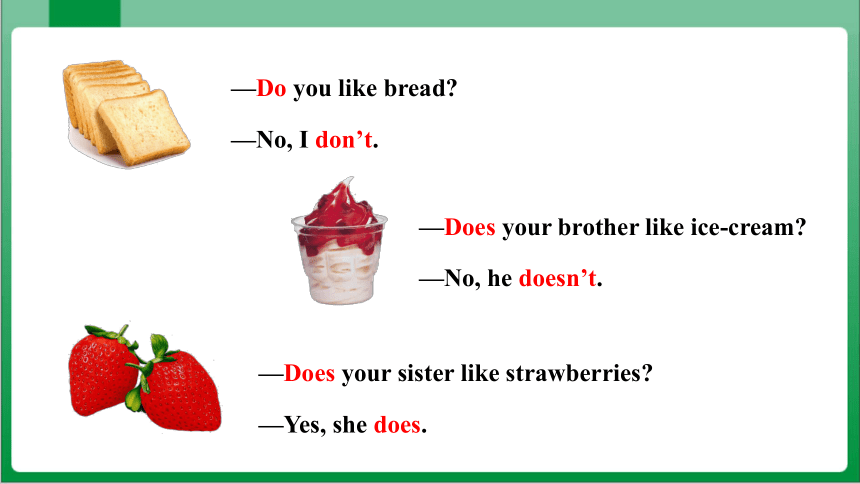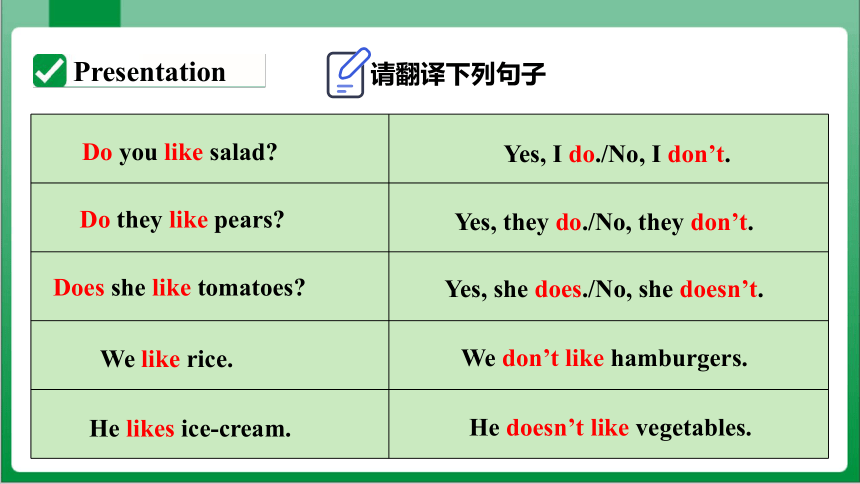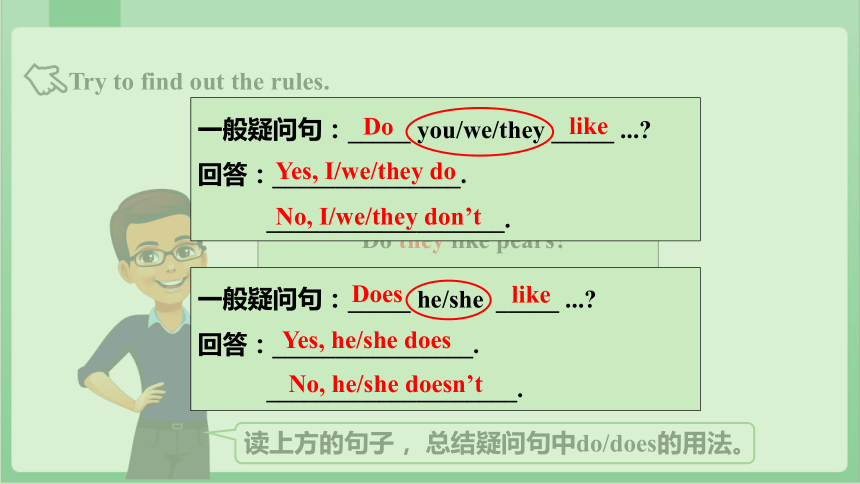Unit6 SectionA Grammar Focus~3c 课件【人教七上Unit 6 Do you like bananas?】
文档属性
| 名称 | Unit6 SectionA Grammar Focus~3c 课件【人教七上Unit 6 Do you like bananas?】 |

|
|
| 格式 | pptx | ||
| 文件大小 | 8.1MB | ||
| 资源类型 | 试卷 | ||
| 版本资源 | 人教新目标(Go for it)版 | ||
| 科目 | 英语 | ||
| 更新时间 | 2023-11-29 23:05:14 | ||
图片预览









文档简介
(共29张PPT)
人教七上英语同步精品课件
人教版七年级上册
Unit 6
Do you like bananas
Section A
Grammar Focus ~ 3c
Learning Goals
Warming Up
Grammar
Summary
Exercises
1
1
2
3
4
5
通过本课的学习,学生能够:
①学会含有动词like的一般现在时的肯定句、否定句及一般疑问句的简略回答。
②认识可数名词的单复数及不可数名词,总结可数名词变复数的规则。
③能询问或陈述对食物的喜好,灵活运用所学句型进行口头交流。
Learning Goals
Warming Up
Look at the picture and make conversations about likes and dislikes.
—I like bananas. Do you like bananas
—Yes, I do.
—Do you like bread
—No, I don’t.
—Does your brother like ice-cream
—No, he doesn’t.
—Does your sister like strawberries
—Yes, she does.
Presentation
你喜欢沙拉吗? 是的,我喜欢。/不,我不喜欢。
她们喜欢梨吗? 是的,她们喜欢。/不,她们不喜欢。
她喜欢西红柿吗? 是的,她喜欢。/不,她不喜欢。
我们喜欢米饭。 我们不喜欢汉堡包。
他喜欢冰激凌。 他不喜欢蔬菜。
Do you like salad
Yes, I do./No, I don’t.
Do they like pears
Yes, they do./No, they don’t.
Does she like tomatoes
Yes, she does./No, she doesn’t.
We like rice.
We don’t like hamburgers.
He likes ice-cream.
He doesn’t like vegetables.
请翻译下列句子
Do you like salad Yes, I do./No, I don’t.
Do they like pears Yes, they do./No, they don’t.
Does she like tomatoes Yes, she does./No, she doesn’t.
陈述句的例句:肯定句
陈述句的例句:否定句
一般疑问句及其回答
I like oranges.
We like rice.
He likes ice-cream.
I don’t like bananas.
We don’t like hamburgers.
He doesn’t like vegetables.
Try to find out the rules.
Do you like salad
Do they like pears
Does she like tomatoes
Does he like apple
读上方的句子, 总结疑问句中do/does的用法。
一般疑问句:_____ you/we/they _____ ...
回答:_______________.
___________________.
Do
like
Yes, I/we/they do
No, I/we/they don’t
一般疑问句:_____ he/she _____ ...
回答:________________.
____________________.
Does
like
Yes, he/she does
No, he/she doesn’t
可数名词 不可数名词 既可作可数名词又可作不可数名词的词
hamburgers, eggs, oranges, bananas, apples, pears, carrots, vegetables, tomatoes, strawberries milk, bread, rice food, fruit, ice-cream, salad, chicken
/ k r t / n.胡萝卜
/ ra s / n. 大米;米饭
/ t k n /n.鸡肉
/ eɡ / n. 鸡蛋
Try to find out the rules.
可数名词
hamburgers, eggs, bananas, apples, pears
读上方的单词, 总结可数名词复数的用法。
可数名词单数
=可数名词复数
+s
Try to find out the rules.
可数名词
strawberries
读上方的单词, 总结可数名词复数的用法。
可数名词单数:
辅音字母+y结尾
=可数名词复数
+ies
Try to find out the rules.
可数名词
tomatoes
读上方的单词, 总结可数名词复数的用法。
可数名词单数:
有生命,O结尾
=可数名词复数
+es
可数名词与不可数名词的区别
可数名词 不可数名词
定义 指可以用数目来计算的人或事物 指以量计算或作为整体的事物
特点 有单、复数形式 无单复数之分
冠词搭配 可与不定冠词(a/an)、定冠词(the)连用 可与定冠词(the)连用,表特指
可数名词 不可数名词
量的表达 可用具体的数词修饰,如:three students 可借助量词表示一定的数量,其形式为“a/an/数词+量词+of+不可数名词”,如:two bottles of water
可用some, many, few, a few, any, a lot of, lots of来修饰可数名词复数 可用some, little, a little, much, a lot of, lots of来修饰不可数名词
可数名词 不可数名词
作主语时,谓语动词的形式 可数名词单数作主语时,谓语动词用单数形式。 不可数名词作主语时,谓语动词用单数形式。
可数名词复数或者两个(及两个以上的)可数名词单数作主语时,谓语动词用原形。 如果不可数名词前有确切的表示量的名词修饰时,则由表示量的名词的单复数决定谓语动词的单复数。
可数名词 不可数名词
对名词的量进行提问 用how many对可数名词的数量进行提问。 用how much对不可数名词的数量进行提问。
可数名词复数的变化规则
变化规则 举例
大多数词后加 s book→books;
chair→chairs
以s、x、ch、sh结尾的词后加 es bus→buses; box→boxes;watch→watches;brush→brushes
以辅音字母+y结尾的名词,去掉y,再加 ies city→cities
family→families
变化规则 举例
以o结尾的名词,无生命的加 s,有生命的加 es piano→pianos
potato→potatoes
以f或fe结尾的词,去掉f或fe,再加 ves knife→knives
shelf→shelves
特殊变化 man→men;
foot→feet
child→children
Practice
3a. Underline the correct words in the brackets.
1. I like fruit, but I (don’t / doesn’t) like vegetables.
2. She (like / likes) bread, but she (doesn’t / don’t) like salad.
3. He (like / likes) bananas, but he (don’t / doesn’t) like oranges.
4. We (likes / like) hamburgers, but we don’t (like / likes) chicken.
5. They (likes / like) pears, but they (don’t / doesn’t) like strawberries.
3b. Number these sentences [1-4] to make a conversation.
A: Do you like salad
B: Yes, I do.
A: So, let’s get salad.
B: OK.
So, let’s get salad. Yes, I do. Do you like salad OK.
3
2
1
4
So what are you going to do next
那么接下来你要做什么?
so作连词,在句中表示“那么”,位于句首用于引出评论或问题。
/ s / conj. (引出评论或问题)那么
Make your own conversation.
S1:Do you like oranges
S2:Yes, I do.
S1:So, let’s get some oranges.
S2:OK.
Production
3c. Ask your classmates about the food in the chart. Find out what they like and don’t like.
Food Likes Doesn’t like
ice-cream Liu Li Zhao Jun
hamburgers
oranges
milk
salad
strawberries
tomatoes
bananas
Exercises
一、单项选择
B
1. — Does Max like apples
— _______. He always eats apples after lunch.
A. Yes, he has B. Yes, he does
C. No, he doesn’t D. No, he doesn’t have
2. Bob likes _@2@___ for lunch, but I like ______ .
A. hamburger; chicken B. hamburgers; chicken
C. hamburger; chickens D. hamburgers; chickens
B
3. How many _@4@___ do you need?
A. juice B. rice C. water D. bananas
D
4. Anna likes fruit, but she _@5@___ vegetables.
A. likes B. don’t like C. doesn’t like D. like
C
二、用所给词的适当形式填空。
1. Tom and I like __________(tomato). How about you
2. — What fruit do you like
— I like _________ (apple).
3. We can see some _________(food) and _________(book)on the desk.
4. I have three __________(orange) and two____________(strawberry).
tomatoes
apples
food
books
oranges
strawberries
Summary
1. Grammar:
一般疑问句及简略回答;可数名词和不可数名词。
2. Key words and expressions:
egg; carrot; rice; chicken; so.
谢谢
21世纪教育网(www.21cnjy.com)
中小学教育资源网站
兼职招聘:
https://www.21cnjy.com/recruitment/home/admin
人教七上英语同步精品课件
人教版七年级上册
Unit 6
Do you like bananas
Section A
Grammar Focus ~ 3c
Learning Goals
Warming Up
Grammar
Summary
Exercises
1
1
2
3
4
5
通过本课的学习,学生能够:
①学会含有动词like的一般现在时的肯定句、否定句及一般疑问句的简略回答。
②认识可数名词的单复数及不可数名词,总结可数名词变复数的规则。
③能询问或陈述对食物的喜好,灵活运用所学句型进行口头交流。
Learning Goals
Warming Up
Look at the picture and make conversations about likes and dislikes.
—I like bananas. Do you like bananas
—Yes, I do.
—Do you like bread
—No, I don’t.
—Does your brother like ice-cream
—No, he doesn’t.
—Does your sister like strawberries
—Yes, she does.
Presentation
你喜欢沙拉吗? 是的,我喜欢。/不,我不喜欢。
她们喜欢梨吗? 是的,她们喜欢。/不,她们不喜欢。
她喜欢西红柿吗? 是的,她喜欢。/不,她不喜欢。
我们喜欢米饭。 我们不喜欢汉堡包。
他喜欢冰激凌。 他不喜欢蔬菜。
Do you like salad
Yes, I do./No, I don’t.
Do they like pears
Yes, they do./No, they don’t.
Does she like tomatoes
Yes, she does./No, she doesn’t.
We like rice.
We don’t like hamburgers.
He likes ice-cream.
He doesn’t like vegetables.
请翻译下列句子
Do you like salad Yes, I do./No, I don’t.
Do they like pears Yes, they do./No, they don’t.
Does she like tomatoes Yes, she does./No, she doesn’t.
陈述句的例句:肯定句
陈述句的例句:否定句
一般疑问句及其回答
I like oranges.
We like rice.
He likes ice-cream.
I don’t like bananas.
We don’t like hamburgers.
He doesn’t like vegetables.
Try to find out the rules.
Do you like salad
Do they like pears
Does she like tomatoes
Does he like apple
读上方的句子, 总结疑问句中do/does的用法。
一般疑问句:_____ you/we/they _____ ...
回答:_______________.
___________________.
Do
like
Yes, I/we/they do
No, I/we/they don’t
一般疑问句:_____ he/she _____ ...
回答:________________.
____________________.
Does
like
Yes, he/she does
No, he/she doesn’t
可数名词 不可数名词 既可作可数名词又可作不可数名词的词
hamburgers, eggs, oranges, bananas, apples, pears, carrots, vegetables, tomatoes, strawberries milk, bread, rice food, fruit, ice-cream, salad, chicken
/ k r t / n.胡萝卜
/ ra s / n. 大米;米饭
/ t k n /n.鸡肉
/ eɡ / n. 鸡蛋
Try to find out the rules.
可数名词
hamburgers, eggs, bananas, apples, pears
读上方的单词, 总结可数名词复数的用法。
可数名词单数
=可数名词复数
+s
Try to find out the rules.
可数名词
strawberries
读上方的单词, 总结可数名词复数的用法。
可数名词单数:
辅音字母+y结尾
=可数名词复数
+ies
Try to find out the rules.
可数名词
tomatoes
读上方的单词, 总结可数名词复数的用法。
可数名词单数:
有生命,O结尾
=可数名词复数
+es
可数名词与不可数名词的区别
可数名词 不可数名词
定义 指可以用数目来计算的人或事物 指以量计算或作为整体的事物
特点 有单、复数形式 无单复数之分
冠词搭配 可与不定冠词(a/an)、定冠词(the)连用 可与定冠词(the)连用,表特指
可数名词 不可数名词
量的表达 可用具体的数词修饰,如:three students 可借助量词表示一定的数量,其形式为“a/an/数词+量词+of+不可数名词”,如:two bottles of water
可用some, many, few, a few, any, a lot of, lots of来修饰可数名词复数 可用some, little, a little, much, a lot of, lots of来修饰不可数名词
可数名词 不可数名词
作主语时,谓语动词的形式 可数名词单数作主语时,谓语动词用单数形式。 不可数名词作主语时,谓语动词用单数形式。
可数名词复数或者两个(及两个以上的)可数名词单数作主语时,谓语动词用原形。 如果不可数名词前有确切的表示量的名词修饰时,则由表示量的名词的单复数决定谓语动词的单复数。
可数名词 不可数名词
对名词的量进行提问 用how many对可数名词的数量进行提问。 用how much对不可数名词的数量进行提问。
可数名词复数的变化规则
变化规则 举例
大多数词后加 s book→books;
chair→chairs
以s、x、ch、sh结尾的词后加 es bus→buses; box→boxes;watch→watches;brush→brushes
以辅音字母+y结尾的名词,去掉y,再加 ies city→cities
family→families
变化规则 举例
以o结尾的名词,无生命的加 s,有生命的加 es piano→pianos
potato→potatoes
以f或fe结尾的词,去掉f或fe,再加 ves knife→knives
shelf→shelves
特殊变化 man→men;
foot→feet
child→children
Practice
3a. Underline the correct words in the brackets.
1. I like fruit, but I (don’t / doesn’t) like vegetables.
2. She (like / likes) bread, but she (doesn’t / don’t) like salad.
3. He (like / likes) bananas, but he (don’t / doesn’t) like oranges.
4. We (likes / like) hamburgers, but we don’t (like / likes) chicken.
5. They (likes / like) pears, but they (don’t / doesn’t) like strawberries.
3b. Number these sentences [1-4] to make a conversation.
A: Do you like salad
B: Yes, I do.
A: So, let’s get salad.
B: OK.
So, let’s get salad. Yes, I do. Do you like salad OK.
3
2
1
4
So what are you going to do next
那么接下来你要做什么?
so作连词,在句中表示“那么”,位于句首用于引出评论或问题。
/ s / conj. (引出评论或问题)那么
Make your own conversation.
S1:Do you like oranges
S2:Yes, I do.
S1:So, let’s get some oranges.
S2:OK.
Production
3c. Ask your classmates about the food in the chart. Find out what they like and don’t like.
Food Likes Doesn’t like
ice-cream Liu Li Zhao Jun
hamburgers
oranges
milk
salad
strawberries
tomatoes
bananas
Exercises
一、单项选择
B
1. — Does Max like apples
— _______. He always eats apples after lunch.
A. Yes, he has B. Yes, he does
C. No, he doesn’t D. No, he doesn’t have
2. Bob likes _@2@___ for lunch, but I like ______ .
A. hamburger; chicken B. hamburgers; chicken
C. hamburger; chickens D. hamburgers; chickens
B
3. How many _@4@___ do you need?
A. juice B. rice C. water D. bananas
D
4. Anna likes fruit, but she _@5@___ vegetables.
A. likes B. don’t like C. doesn’t like D. like
C
二、用所给词的适当形式填空。
1. Tom and I like __________(tomato). How about you
2. — What fruit do you like
— I like _________ (apple).
3. We can see some _________(food) and _________(book)on the desk.
4. I have three __________(orange) and two____________(strawberry).
tomatoes
apples
food
books
oranges
strawberries
Summary
1. Grammar:
一般疑问句及简略回答;可数名词和不可数名词。
2. Key words and expressions:
egg; carrot; rice; chicken; so.
谢谢
21世纪教育网(www.21cnjy.com)
中小学教育资源网站
兼职招聘:
https://www.21cnjy.com/recruitment/home/admin
同课章节目录
- starters 预备篇(2012秋审查)
- Unit 1 Good morning !
- Unit 2 What’s this in English?
- Unit 3 What color is it ?
- Unit 1 My name's Gina.
- Section A
- Section B
- Unit 2 This is my sister.
- Section A
- Section B
- Unit 3 Is this your pencil?
- Section A
- Section B
- Unit 4 Where's my schoolbag?
- Section A
- Section B
- Unit 5 Do you have a soccer ball?
- Section A
- Section B
- Unit 6 Do you like bananas?
- Section A
- Section B
- Unit 7 How much are these socks?
- Section A
- Section B
- Unit 8 When is your birthday?
- Section A
- Section B
- Unit 9 My favorite subject is science.
- Section A
- Section B
